| Listing 1 - 10 of 70 | << page >> |
Sort by
|
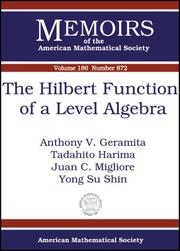
ISBN: 9780821839409 0821839403 Year: 2007 Publisher: Providence American Mathematical Society
Abstract | Keywords | Export | Availability | Bookmark
 Loading...
Loading...Choose an application
- Reference Manager
- EndNote
- RefWorks (Direct export to RefWorks)
Ordered algebraic structures --- 51 <082.1> --- Mathematics--Series --- Algebra, Homological --- Characteristic functions. --- Fonctions caractéristiques --- Algèbre homologique --- Characteristic functions --- Characteristic formula of an ideal --- Characteristic Hilbert functions --- Functions, Characteristic --- Functions, Hilbert --- Hilbert characteristic functions --- Hilbert functions --- Hilbert's characteristic functions --- Hilbert's functions --- Postulation formula --- Probabilities --- Homological algebra --- Algebra, Abstract --- Homology theory --- Fonctions caractéristiques. --- Algèbre homologique.
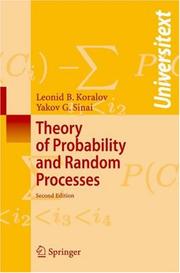
ISBN: 3540688293 3540254846 Year: 2007 Publisher: Berlin, Heidelberg : Springer Berlin Heidelberg : Imprint: Springer,
Abstract | Keywords | Export | Availability | Bookmark
 Loading...
Loading...Choose an application
- Reference Manager
- EndNote
- RefWorks (Direct export to RefWorks)
A one-year course in probability theory and the theory of random processes, taught at Princeton University to undergraduate and graduate students, forms the core of the content of this book It is structured in two parts: the first part providing a detailed discussion of Lebesgue integration, Markov chains, random walks, laws of large numbers, limit theorems, and their relation to Renormalization Group theory. The second part includes the theory of stationary random processes, martingales, generalized random processes, Brownian motion, stochastic integrals, and stochastic differential equations. One section is devoted to the theory of Gibbs random fields. This material is essential to many undergraduate and graduate courses. The book can also serve as a reference for scientists using modern probability theory in their research.
Probabilities. --- Stochastic processes. --- Probability --- Statistical inference --- Combinations --- Mathematics --- Chance --- Least squares --- Mathematical statistics --- Risk --- Random processes --- Probabilities --- Distribution (Probability theory. --- Probability Theory and Stochastic Processes. --- Distribution functions --- Frequency distribution --- Characteristic functions
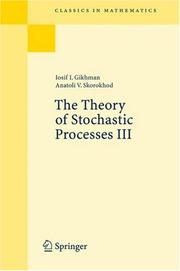
ISBN: 3540499407 3540499415 Year: 2007 Publisher: Berlin, Heidelberg : Springer Berlin Heidelberg : Imprint: Springer,
Abstract | Keywords | Export | Availability | Bookmark
 Loading...
Loading...Choose an application
- Reference Manager
- EndNote
- RefWorks (Direct export to RefWorks)
From the Reviews: "Gihman and Skorohod have done an excellent job of presenting the theory in its present state of rich imperfection." D.W. Stroock in Bulletin of the American Mathematical Society, 1980 "To call this work encyclopedic would not give an accurate picture of its content and style. Some parts read like a textbook, but others are more technical and contain relatively new results. ... The exposition is robust and explicit, as one has come to expect of the Russian tradition of mathematical writing. The set when completed will be an invaluable source of information and reference in this ever-expanding field" K.L. Chung in American Scientist, 1977 "..., the subject has grown enormously since 1953, and there will never be a true successor to Doob's book, but Gihman and Skorohod's three volumes will, I think, occupy a rather similar position as an invaluable tool of reference for all probability theorists. ... The dominant impression is of the authors' mastery of their material, and of their confident insight into its underlying structure. ..." J.F.C. Kingman in Bulletin of the London Mathematical Society, 1977.
Distribution (Probability theory. --- Mathematics --- Physical Sciences & Mathematics --- Mathematical Statistics --- Stochastic processes. --- Random processes --- Mathematics. --- Probabilities. --- Probability Theory and Stochastic Processes. --- Probabilities --- Distribution functions --- Frequency distribution --- Characteristic functions --- Probability --- Statistical inference --- Combinations --- Chance --- Least squares --- Mathematical statistics --- Risk
Book
ISBN: 1281140740 9786611140748 3211733663 Year: 2007 Volume: no. 491 Publisher: Vienna : Springer Vienna : Imprint: Springer,
Abstract | Keywords | Export | Availability | Bookmark
 Loading...
Loading...Choose an application
- Reference Manager
- EndNote
- RefWorks (Direct export to RefWorks)
Soils and rocks are among the most variable of all engineering materials, and as such are highly amenable to a probabilistic treatment. The application of statistical and probabilistic concepts to geotechnical analysis is a rapidly growing area of interest for both academics and practitioners. The book is therefore aimed at students, researchers, and practitioners of geotechnical engineering who wish to keep abreast of developments in this evolving field of study. The course content and will assume no more that an introductory understanding of probability and statistics on the part of the course participants. The main objective is to present a state-of-the-art training on probabilistic techniques applied to geotechnical engineering in relation to both theory and practice. Including: (a) discussion of potential benefits of probabilistic approaches as opposed to the classical “Factor of Safety” methods, to review sources of uncertainty in geotechnical analysis and to introduce methods of LRFD and reliability concepts in Eurocode 7, (b) review of relevant statistical theories needed to develop the methodologies and interpret the results of probabilistic analysis, (c) examples of established probabilistic methods of analysis in geotechnical engineering, such as the First Order Second Moment (FOSM) method, the Point Estimate Method (PEM), the First and Second Order Reliability Methods (FORM SORM) and Random Set (RS) theory, (d) description of numerical methods of probabilistic analysis based on the finite element method, such as the Stochastic Finite Element Method (SFEM) and recent developments on the Random Finite Element Method (RFEM), (e) practical examples and case histories of probabilistic applications in geotechnical engineering.
Soil mechanics --- Probabilities. --- Statistical methods. --- Probability --- Statistical inference --- Combinations --- Mathematics --- Chance --- Least squares --- Mathematical statistics --- Risk --- Soil engineering --- Soils --- Soils (Engineering) --- Geotechnical engineering --- Mechanics --- Foundations --- Soil physics --- Civil engineering. --- Distribution (Probability theory. --- Geotechnical Engineering & Applied Earth Sciences. --- Civil Engineering. --- Probability Theory and Stochastic Processes. --- Distribution functions --- Frequency distribution --- Characteristic functions --- Probabilities --- Engineering --- Public works --- Geotechnical engineering. --- Engineering, Geotechnical --- Geotechnics --- Geotechnology --- Engineering geology
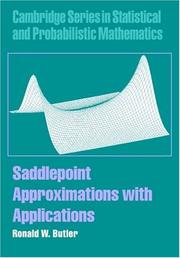
ISBN: 9780521872508 0521872502 9780511619083 9780511342394 051134239X 0511341326 9780511341328 0511619081 1107180724 1281084972 9786611084974 0511341865 0511340745 0511573715 Year: 2007 Volume: 22 Publisher: Cambridge : Cambridge University Press,
Abstract | Keywords | Export | Availability | Bookmark
 Loading...
Loading...Choose an application
- Reference Manager
- EndNote
- RefWorks (Direct export to RefWorks)
Modern statistical methods use complex, sophisticated models that can lead to intractable computations. Saddlepoint approximations can be the answer. Written from the user's point of view, this book explains in clear language how such approximate probability computations are made, taking readers from the very beginnings to current applications. The core material is presented in chapters 1-6 at an elementary mathematical level. Chapters 7-9 then give a highly readable account of higher-order asymptotic inference. Later chapters address areas where saddlepoint methods have had substantial impact: multivariate testing, stochastic systems and applied probability, bootstrap implementation in the transform domain, and Bayesian computation and inference. No previous background in the area is required. Data examples from real applications demonstrate the practical value of the methods. Ideal for graduate students and researchers in statistics, biostatistics, electrical engineering, econometrics, and applied mathematics, this is both an entry-level text and a valuable reference.
Method of steepest descent (Numerical analysis) --- Method of steepest descent (Numerical analysis). --- Distribution (Probability theory) --- Approximations, Saddlepoint --- Descent, Method of steepest (Numerical analysis) --- Method of saddle points (Numerical analysis) --- Saddle point method (Numerical analysis) --- Saddle points, Method of (Numerical analysis) --- Saddlepoint approximations --- Saddlepoint method (Numerical analysis) --- Steepest descent method (Numerical analysis) --- Approximation theory --- Asymptotic expansions --- Distribution functions --- Frequency distribution --- Characteristic functions --- Probabilities
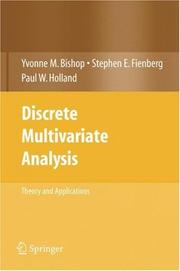
ISBN: 0387728058 9786611337896 1281337897 0387728066 Year: 2007 Publisher: New York, NY : Springer New York : Imprint: Springer,
Abstract | Keywords | Export | Availability | Bookmark
 Loading...
Loading...Choose an application
- Reference Manager
- EndNote
- RefWorks (Direct export to RefWorks)
"At last, after a decade of mounting interest in log-linear and related models for the analysis of discrete multivariate data, particularly in the form of multidimensional tables, we now have a comprehensive text and general reference on the subject. Even a mediocre attempt to organize the extensive and widely scattered literature on discrete multivariate analysis would be welcome; happily, this is an excellent such effort, but a group of Harvard statisticians that has contributed much to the field. Their book ought to serve as a basic guide to the analysis of quantitative data for years to come." --James R. Beninger, Contemporary Sociology "A welcome addition to multivariate analysis. The discussion is lucid and very leisurely, excellently illustrated with applications drawn from a wide variety of fields. A good part of the book can be understood without very specialized statistical knowledge. It is a most welcome contribution to an interesting and lively subject." --D.R. Cox, Nature "Discrete Multivariate Analysis is an ambitious attempt to present log-linear models to a broad audience. Exposition is quite discursive, and the mathematical level, except in Chapters 12 and 14, is very elementary. To illustrate possible applications, some 60 different sets of data have been gathered together from diverse fields. To aid the reader, an index of these examples has been provided. ...the book contains a wealth of material on important topics. Its numerous examples are especially valuable." --Shelby J. Haberman, The Annals of Statistics.
Mathematics. --- Probabilities. --- Statistics. --- Probability Theory and Stochastic Processes. --- Statistical Theory and Methods. --- Statistical analysis --- Statistical data --- Statistical methods --- Statistical science --- Mathematics --- Econometrics --- Probability --- Statistical inference --- Combinations --- Chance --- Least squares --- Mathematical statistics --- Risk --- Math --- Science --- Distribution (Probability theory. --- Mathematical statistics. --- Statistics, Mathematical --- Statistics --- Probabilities --- Sampling (Statistics) --- Distribution functions --- Frequency distribution --- Characteristic functions --- Statistics .
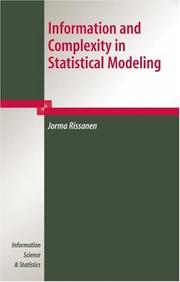
ISBN: 1281140643 9786611140649 0387688129 0387366105 1441922679 Year: 2007 Publisher: New York, NY : Springer New York : Imprint: Springer,
Abstract | Keywords | Export | Availability | Bookmark
 Loading...
Loading...Choose an application
- Reference Manager
- EndNote
- RefWorks (Direct export to RefWorks)
No statistical model is "true" or "false," "right" or "wrong"; the models just have varying performance, which can be assessed. The main theme in this book is to teach modeling based on the principle that the objective is to extract the information from data that can be learned with suggested classes of probability models. The intuitive and fundamental concepts of complexity, learnable information, and noise are formalized, which provides a firm information theoretic foundation for statistical modeling. Inspired by Kolmogorov's structure function in the algorithmic theory of complexity, this is accomplished by finding the shortest code length, called the stochastic complexity, with which the data can be encoded when advantage is taken of the models in a suggested class, which amounts to the MDL (Minimum Description Length) principle. The complexity, in turn, breaks up into the shortest code length for the optimal model in a set of models that can be optimally distinguished from the given data and the rest, which defines "noise" as the incompressible part in the data without useful information. Such a view of the modeling problem permits a unified treatment of any type of parameters, their number, and even their structure. Since only optimally distinguished models are worthy of testing, we get a logically sound and straightforward treatment of hypothesis testing, in which for the first time the confidence in the test result can be assessed. Although the prerequisites include only basic probability calculus and statistics, a moderate level of mathematical proficiency would be beneficial. The different and logically unassailable view of statistical modelling should provide excellent grounds for further research and suggest topics for graduate students in all fields of modern engineering, including and not restricted to signal and image processing, bioinformatics, pattern recognition, and machine learning to mention just a few. The author is an Honorary Doctor and Professor Emeritus of the Technical University of Tampere, Finland, a Fellow of Helsinki Institute for Information Technology, and visiting Professor in the Computer Learning Research Center of University of London, Holloway, England. He is also a Foreign Member of Finland's Academy of Science and Letters, an Associate Editor of IMA Journal of Mathematical Control and Information and of EURASIP Journal on Bioinformatics and Systems Biology. He is also a former Associate Editor of Source Coding of IEEE Transactions on Information Theory. The author is the recipient of the IEEE Information Theory Society's 1993 Richard W. Hamming medal for fundamental contributions to information theory, statistical inference, control theory, and the theory of complexity; the Information Theory Society's Golden Jubilee Award in 1998 for Technological Innovation for inventing Arithmetic Coding; and the 2006 Kolmogorov medal by University of London. He has also received an IBM Corporate Award for the MDL and PMDL Principles in 1991, and two best paper awards.
Statistics. --- Statistical analysis --- Statistical data --- Statistical methods --- Statistical science --- Mathematics --- Econometrics --- Distribution (Probability theory. --- Coding theory. --- Probability Theory and Stochastic Processes. --- Coding and Information Theory. --- Statistics for Engineering, Physics, Computer Science, Chemistry and Earth Sciences. --- Data compression (Telecommunication) --- Digital electronics --- Information theory --- Machine theory --- Signal theory (Telecommunication) --- Computer programming --- Distribution functions --- Frequency distribution --- Characteristic functions --- Probabilities --- Probabilities. --- Information theory. --- Statistics . --- Communication theory --- Communication --- Cybernetics --- Probability --- Statistical inference --- Combinations --- Chance --- Least squares --- Mathematical statistics --- Risk
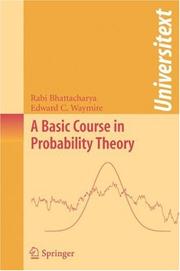
ISBN: 0387719393 0387719385 Year: 2007 Publisher: New York, NY : Springer New York : Imprint: Springer,
Abstract | Keywords | Export | Availability | Bookmark
 Loading...
Loading...Choose an application
- Reference Manager
- EndNote
- RefWorks (Direct export to RefWorks)
The book develops the necessary background in probability theory underlying diverse treatments of stochastic processes and their wide-ranging applications. With this goal in mind, the pace is lively, yet thorough. Basic notions of independence and conditional expectation are introduced relatively early on in the text, while conditional expectation is illustrated in detail in the context of martingales, Markov property and strong Markov property. Weak convergence of probabilities on metric spaces and Brownian motion are two highlights. The historic role of size-biasing is emphasized in the contexts of large deviations and in developments of Tauberian Theory. The authors assume a graduate level of maturity in mathematics, but otherwise the book will be suitable for students with varying levels of background in analysis and measure theory. In particular, theorems from analysis and measure theory used in the main text are provided in comprehensive appendices, along with their proofs, for ease of reference. Rabi Bhattacharya is Professor of Mathematics at the University of Arizona. Edward Waymire is Professor of Mathematics at Oregon State University. Both authors have co-authored numerous books, including the graduate textbook, Stochastic Processes with Applications.
Mathematics. --- Probabilities. --- Probability --- Statistical inference --- Combinations --- Mathematics --- Chance --- Least squares --- Mathematical statistics --- Risk --- Math --- Science --- Distribution (Probability theory. --- Global analysis (Mathematics). --- Probability Theory and Stochastic Processes. --- Measure and Integration. --- Analysis. --- Analysis, Global (Mathematics) --- Differential topology --- Functions of complex variables --- Geometry, Algebraic --- Distribution functions --- Frequency distribution --- Characteristic functions --- Probabilities --- Measure theory. --- Mathematical analysis. --- Analysis (Mathematics). --- Lebesgue measure --- Measurable sets --- Measure of a set --- Algebraic topology --- Integrals, Generalized --- Measure algebras --- Rings (Algebra) --- 517.1 Mathematical analysis --- Mathematical analysis
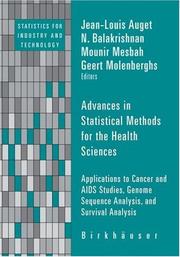
ISBN: 081764542X 0817643680 9780817643683 Year: 2007 Publisher: Boston, MA : Birkhäuser Boston : Imprint: Birkhäuser,
Abstract | Keywords | Export | Availability | Bookmark
 Loading...
Loading...Choose an application
- Reference Manager
- EndNote
- RefWorks (Direct export to RefWorks)
Statistical methods have become increasingly important and now form integral part of research in the health sciences. Many sophisticated methodologies have been developed for specific applications and problems. This self-contained volume, an outgrowth of an "International Conference on Statistical Methods in Health Sciences," covers a wide range of topics pertaining to new statistical methods and novel applications in the health sciences. The chapters, written by leading experts in their respective fields, are thematically divided into the following areas: * Prognostic studies and general epidemiology * Pharmacovigilance * Quality of life * Survival analysis * Clustering * Safety and efficacy assessment * Clinical design * Models for the environment * Genomic analysis * Animal health This comprehensive volume will be highly useful an of great interest to the health science community as well as practitioners, researchers, and graduate students in applied probability, statistics, and biostatistics. .
Medical statistics. --- Epidemiology. --- Diseases --- Public health --- Health --- Health statistics --- Medicine --- Statistics --- Statistical methods --- Mathematical statistics --- Distribution (Probability theory. --- Mathematics. --- Statistics. --- Mathematical statistics. --- Probability Theory and Stochastic Processes. --- Applications of Mathematics. --- Statistics for Life Sciences, Medicine, Health Sciences. --- Statistical Theory and Methods. --- Mathematics --- Statistical inference --- Statistics, Mathematical --- Probabilities --- Sampling (Statistics) --- Statistical analysis --- Statistical data --- Statistical science --- Econometrics --- Math --- Science --- Distribution functions --- Frequency distribution --- Characteristic functions --- Probabilities. --- Applied mathematics. --- Engineering mathematics. --- Statistics . --- Probability --- Combinations --- Chance --- Least squares --- Risk --- Engineering --- Engineering analysis --- Mathematical analysis
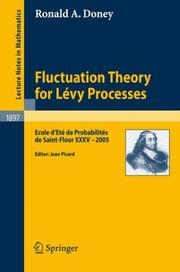
ISBN: 9783540485100 3540485104 9786610853359 1280853352 3540485112 Year: 2007 Volume: 1897 Publisher: Berlin, Heidelberg : Springer-Verlag,
Abstract | Keywords | Export | Availability | Bookmark
 Loading...
Loading...Choose an application
- Reference Manager
- EndNote
- RefWorks (Direct export to RefWorks)
Lévy processes, i.e. processes in continuous time with stationary and independent increments, are named after Paul Lévy, who made the connection with infinitely divisible distributions and described their structure. They form a flexible class of models, which have been applied to the study of storage processes, insurance risk, queues, turbulence, laser cooling, ... and of course finance, where the feature that they include examples having "heavy tails" is particularly important. Their sample path behaviour poses a variety of difficult and fascinating problems. Such problems, and also some related distributional problems, are addressed in detail in these notes that reflect the content of the course given by R. Doney in St. Flour in 2005.
Lévy processes. --- Lévy, Processus de --- Electronic books. -- local. --- Lévy processes. --- Random walks (Mathematics). --- Lâevy processes --- Mathematics --- Physical Sciences & Mathematics --- Mathematical Theory --- Mathematical Statistics --- Random walks (Mathematics) --- Lévy, Processus de --- EPUB-LIV-FT SPRINGER-B --- Additive process (Probability theory) --- Random walk process (Mathematics) --- Walks, Random (Mathematics) --- Mathematics. --- Probabilities. --- Probability Theory and Stochastic Processes. --- Probability --- Statistical inference --- Combinations --- Chance --- Least squares --- Mathematical statistics --- Risk --- Math --- Science --- Stochastic processes --- Distribution (Probability theory. --- Distribution functions --- Frequency distribution --- Characteristic functions --- Probabilities
| Listing 1 - 10 of 70 | << page >> |
Sort by
|

 Search
Search Feedback
Feedback About
About Help
Help News
News